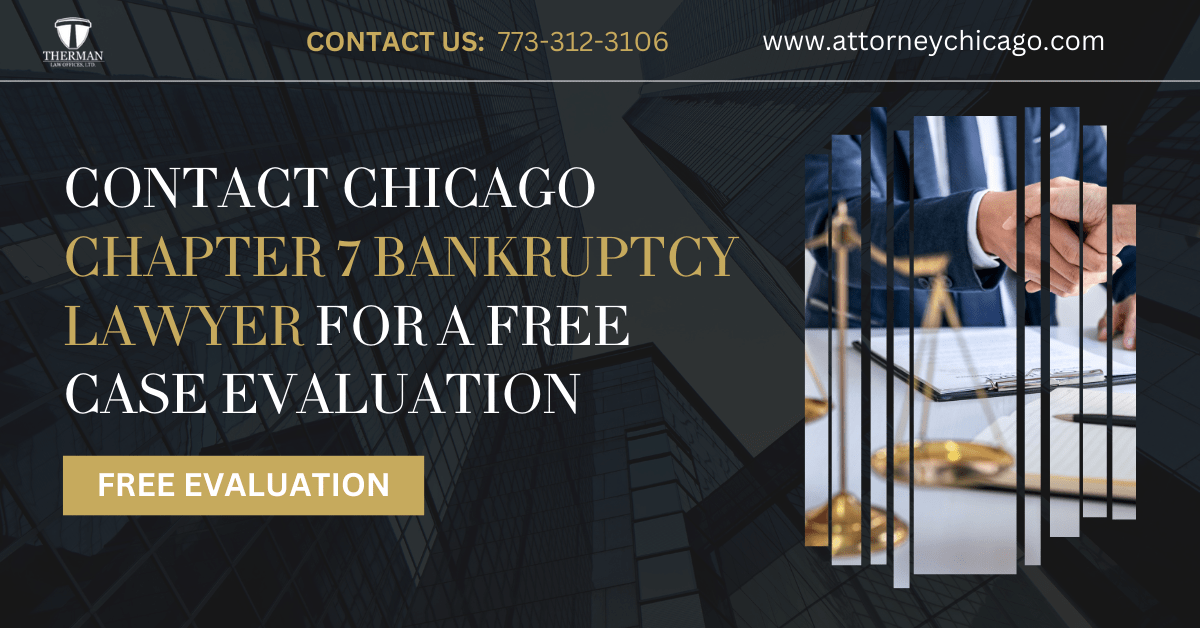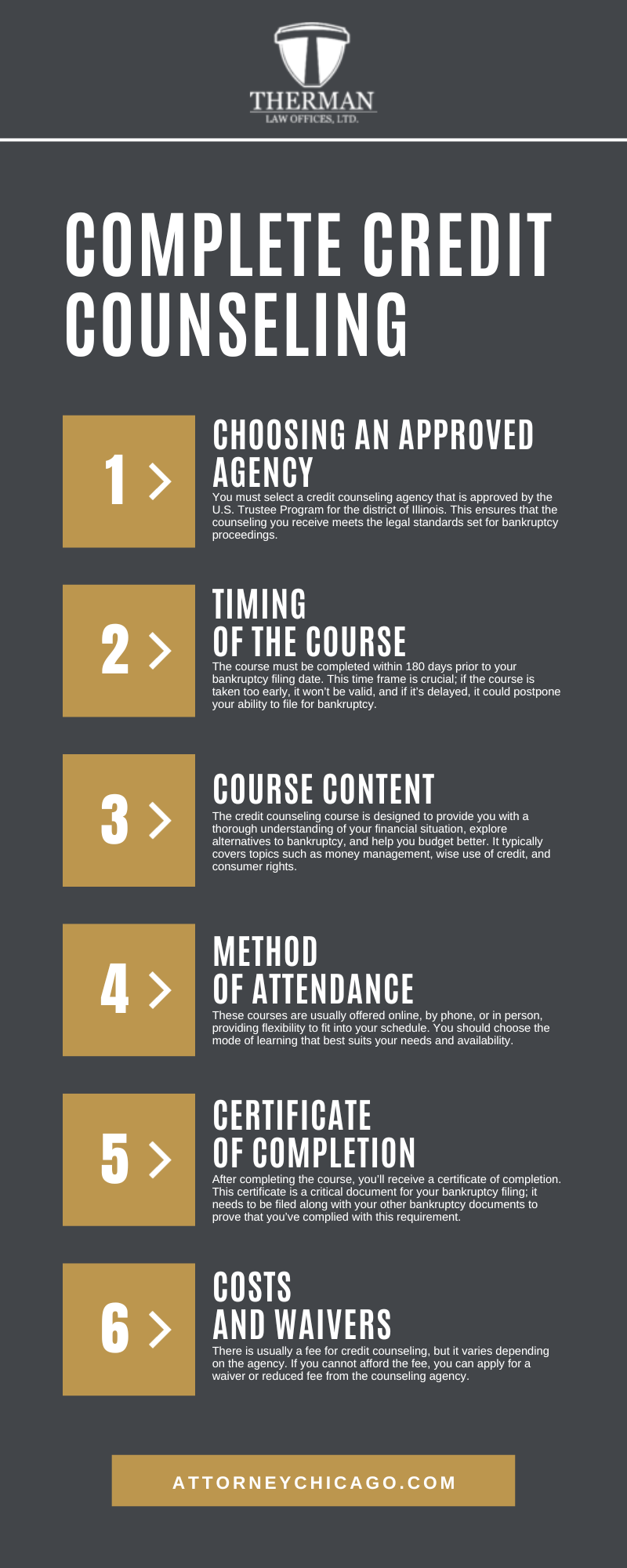Our Chicago Chapter 7 bankruptcy lawyer understands the nuanced and often overwhelming nature of financial hardships. Our team of dedicated attorneys, with their deep understanding of bankruptcy laws, are here to guide you through every step of the Chapter 7 bankruptcy process. We pride ourselves on our empathetic approach to each unique case, confirming that our clients in Chicago and beyond receive personalized attention and tailored solutions. We have over 35 years of combined experience helping out clients with their legal issues.
At Therman Law Offices, LTD, we specialize in offering comprehensive legal solutions to those facing financial challenges. We believe in empowering our clients with knowledge and resources, making the journey from financial distress to stability as smooth and understandable as possible. With our extensive experience and client-focused approach, we are committed to upholding your rights and securing your financial future, making us a trusted partner in your journey to regain financial control.

The Timeline of Filing For Chapter 7 Bankruptcy
Filing for Chapter 7 bankruptcy in Illinois is a methodical legal journey, involving multiple steps, each with its own duration and significance. This process, conducted under the guidance of Therman Law Offices, LTD, unfolds as follows:
Mandatory Credit Counseling (1-2 hours)
Prior to filing, you’re required to complete a credit counseling course from a government-approved agency. This typically takes 1-2 hours, culminating in a certificate, a mandatory document for your bankruptcy filing.
Compilation of Financial Documents (1-4 weeks)
You’ll need to amass a comprehensive set of documents reflecting your financial portfolio. This includes tax returns, pay stubs, bank statements, and a detailed inventory of your assets and liabilities. The timeframe for this phase hinges on your individual circumstances and the specifics of your financial situation.
Filing the Bankruptcy Petition (1 day)
With all documents ready and credit counseling completed, you’ll file your bankruptcy petition with the court. This integral step requires submitting numerous forms that paint a detailed picture of your financial status.
341 Meeting of Creditors (20-40 days post-filing)
Post-filing, a trustee is assigned to oversee your case. You must attend a ‘341 Meeting of Creditors’, generally set around 20-40 days after your petition submission. Here, creditors can ask questions about your finances and the filed documents.
Discharge of Debts (60-90 days following 341 Meeting)
Assuming no objections from creditors or the trustee, your eligible debts are typically discharged approximately 60-90 days after the 341 Meeting. This marks the erasure of your eligible debts under Chapter 7.
Completion of Debtor Education Course (before debt discharge)
An additional educational course, focused on post-bankruptcy financial management, must be completed before the discharge of your debts. This course is distinct from the initial credit counseling.
Overall, the entire Chapter 7 bankruptcy process in Illinois typically spans about 4 to 6 months, starting from the filing of your petition to the final discharge of your debts. The process is designed not just to relieve debt, but also to equip you with the knowledge to manage your finances more effectively in the future.

The Cost of Filing for Chapter 7
Filing for Chapter 7 bankruptcy in Illinois involves several costs that can vary depending on the details of your case and the attorney you choose. Below is a breakdown of the typical costs associated with filing a Chapter 7 bankruptcy:
The court filing fee for a Chapter 7 bankruptcy in Illinois is $338. This fee is standard across the United States, as it is set by federal law. In some cases, if you can demonstrate financial hardship, the court may allow you to pay the filing fee in installments or waive the fee altogether.
You are required to complete a credit counseling course before filing for bankruptcy and a debtor education course before your debts can be discharged. These courses typically cost between $20 to $50 each, though the fee can be waived if you are unable to afford it.
The cost of hiring an attorney is one of the most significant expenses in a Chapter 7 bankruptcy. Attorney’s fees can vary widely depending on the region and the challenges of your case. In Illinois, you can expect to pay anywhere from $1,000 to $2,500 for a Chapter 7 bankruptcy attorney. Some attorneys may charge a flat fee, while others may charge an hourly rate.
There may be additional costs for obtaining copies of your credit report, mailing documents, or other miscellaneous expenses. These costs are usually minimal.
Filing for Chapter 7 bankruptcy in Illinois can be a costly process, with expenses ranging from court fees, educational courses, attorney’s fees, and miscellaneous costs. It’s imperative to be fully aware of these costs and budget accordingly. Hiring our knowledgeable bankruptcy attorney can provide invaluable assistance, confirming the process goes smoothly and helping to secure your financial fresh start.

Qualifying for Chapter 7 Bankruptcy
Qualifying for Chapter 7 bankruptcy in Illinois requires a detailed assessment of your financial situation, adhering to specific legal criteria. This process makes sure that Chapter 7 bankruptcy is appropriate for your circumstances.
Pass the Means Test
As our Chicago Chapter 7 bankruptcy lawyer can tell you, the means test is designed to verify that only those who truly cannot afford to pay their debts are able to file for Chapter 7 bankruptcy. It compares your average monthly income for the six months prior to filing against the median income for a household of your size in Illinois.
- If your income is below the median. You automatically qualify for Chapter 7.
- If your income is above the median. You may still qualify, but additional calculations will be necessary to determine your disposable income after deducting allowed expenses. If your disposable income is below a certain threshold, you can file for Chapter 7.
Assess Your Assets
Illinois has specific exemptions that protect certain assets from being seized in bankruptcy. Before filing, you should list all your assets and compare them against Illinois’ exemption laws to see if they would be protected. If you have significant nonexempt property, the Chapter 7 trustee can sell these assets to repay your creditors, or you might want to consider filing for Chapter 13 bankruptcy instead.
Review Your Debts
Not all debts can be discharged in a Chapter 7 bankruptcy. For example, child support, alimony, student loans (in most cases), and certain tax debts are not dischargeable. Make sure that the debts causing you financial strain will be relieved through bankruptcy.
Check Your Filing History
If you have filed for bankruptcy in the past, it could affect your eligibility for Chapter 7. You must wait eight years after a previous Chapter 7 discharge and six years after a Chapter 13 discharge (unless you paid back a certain percentage of your unsecured debts) to file for Chapter 7 bankruptcy.
Verify You Haven’t Committed Fraud
Any fraudulent activity, such as hiding assets, lying on your bankruptcy forms, or running up a lot of debt right before filing (knowing you won’t pay it back), can result in your Chapter 7 case being dismissed. Make sure all your documentation is accurate and complete.
Complete Credit Counseling
Completing credit counseling is a mandatory prerequisite for filing Chapter 7 bankruptcy, and it involves a few specific steps and requirements:
- Choosing an Approved Agency. You must select a credit counseling agency that is approved by the U.S. Trustee Program for the district of Illinois. This confirms that the counseling you receive meets the legal standards set for bankruptcy proceedings.
- Timing of the Course. The course must be completed within 180 days prior to your bankruptcy filing date. This time frame is paramount; if the course is taken too early, it won’t be valid, and if it’s delayed, it could postpone your ability to file for bankruptcy.
- Course Content. The credit counseling course is designed to provide you with a thorough understanding of your financial situation, explore alternatives to bankruptcy, and help you budget better. It typically covers topics such as money management, wise use of credit, and consumer rights.
- Method of Attendance. These courses are usually offered online, by phone, or in person, providing flexibility to fit into your schedule. You should choose the mode of learning that best suits your needs and availability.
- Certificate of Completion. After completing the course, you’ll receive a certificate of completion. This certificate is a necessary document for your bankruptcy filing; it needs to be filed along with your other bankruptcy documents to prove that you’ve complied with this requirement.
- Costs and Waivers. There is usually a fee for credit counseling, but it varies depending on the agency. If you cannot afford the fee, you can apply for a waiver or reduced fee from the counseling agency.
By completing this mandatory credit counseling, you’re not only meeting a legal requirement but also gaining valuable insights into your financial situation, which can aid in making informed decisions about your bankruptcy and future financial planning.
Potential Downsides of Chapter 7
Filing for Chapter 7 bankruptcy can provide significant relief for individuals overwhelmed by debt, but it also comes with several downsides and long-term consequences.
- Impact on Credit Score
Filing for Chapter 7 bankruptcy will have a substantial negative impact on your credit score. Bankruptcy remains on your credit report for 10 years, making it difficult to obtain credit, a mortgage, or even rent an apartment. Even if you can secure credit, you may face higher interest rates and fees.
- Loss of Property
In a Chapter 7 bankruptcy, you may have to surrender certain assets to be sold off to pay creditors. While there are exemptions to protect fundamental assets (like your home and car, up to a certain value), if you have nonexempt property (like a second home, valuable collections, or investments), you could lose these in the bankruptcy process.
- Inability to Discharge All Debts
Not all debts can be eliminated in a Chapter 7 bankruptcy. Non-dischargeable debts include most student loans, child support, alimony, certain tax debts, and debts from fraudulent activities. If these constitute a significant portion of your debt, Chapter 7 may not provide the relief you need.
- Effect on Co-signers
If someone cosigned a loan for you, they would still be on the hook for the debt even after you file for Chapter 7 bankruptcy. This could strain personal relationships and put financial pressure on the co-signer.
- Emotional Toll
Filing for bankruptcy is a serious decision that can take a significant emotional toll. Many individuals report feeling a sense of failure or shame, and the stress of the process can impact mental health.
- Public Record
Bankruptcy filings are public records, meaning anyone can access details about your financial situation. This lack of privacy can be unsettling for some individuals.
- Difficulty Obtaining Future Credit
After filing for Chapter 7 bankruptcy, you may find it challenging to rebuild your credit. Potential lenders may be hesitant to extend credit, and when they do, it may come with high interest rates and unfavorable terms.
- Impact on Employment and Housing
Some employers and landlords check credit reports as part of their application process. A Chapter 7 bankruptcy on your record could potentially make it more challenging to secure a job or rent an apartment.
- Limited Bankruptcy Filing Frequency
After filing for Chapter 7 bankruptcy, you must wait eight years before you can file for Chapter 7 again. This can be a significant limitation if you face financial difficulties in the interim.
- Legal and Filing Fees
While you may be drowning in debt, filing for bankruptcy isn’t free. There are court filing fees, and if you hire an attorney (which is highly recommended), you will also need to pay legal fees.
Chicago Chapter 7 Bankruptcy Infographic

Chicago Chapter 7 Bankruptcy Statistics
According to the American Bankruptcy Institute, approximately 12,000 people file for Chapter 7 bankruptcy each year in Illinois. Another 8,500 residents file for Chapter 13. If you are struggling with debt, contact a bankruptcy attorney to find out which option may be the best for your situation.
Chicago Chapter 7 Bankruptcy FAQs
What happens to my assets during Chapter 7 bankruptcy in Illinois?
In Chapter 7 bankruptcy in Illinois, your assets may be liquidated by the bankruptcy trustee to pay off your debts. However, Illinois law provides specific exemptions that allow you to keep certain types of property up to a certain value, like a portion of the equity in your home, car, personal belongings, and retirement accounts. It’s important to understand which of your assets are exempt and non-exempt when filing for Chapter 7.
Can I file for Chapter 7 bankruptcy if I’ve filed before?
Yes, you can file for Chapter 7 bankruptcy even if you’ve filed before. However, there are waiting periods: 8 years from the previous Chapter 7 filing date or 6 years from a Chapter 13 filing date. If you attempt to file earlier, your case may be dismissed.
How does filing for Chapter 7 bankruptcy affect my credit score?
Filing for Chapter 7 bankruptcy will have a negative impact on your credit score initially. Bankruptcy can remain on your credit report for up to 10 years, and it may be more challenging to obtain credit during this period. However, many people start to see some improvement in their credit scores as they rebuild their credit over time post-bankruptcy.
Can all types of debts be discharged in Chapter 7 bankruptcy?
Not all debts can be discharged in Chapter 7 bankruptcy. Non-dischargeable debts include alimony and child support obligations, certain taxes, debts for personal injury caused by driving while intoxicated, and most student loans. It’s important to identify which debts can and cannot be eliminated through bankruptcy.
Do I need an attorney to file for Chapter 7 bankruptcy?
While it’s not legally required to have an attorney to file for Chapter 7 bankruptcy, it is highly recommended. Bankruptcy law and procedures can be complicated, and our experienced bankruptcy attorney can help manage the legal system, verify your paperwork is correctly filed, and represent you in court, significantly increasing the likelihood of a successful outcome.
Therman Law Offices, LTD, Chicago Chapter 7 Bankruptcy Lawyer
8501 W Higgins Rd Ste 420, Chicago, IL 60631
Contact Our Legal Professionals Today
Facing the overwhelming burden of unmanageable debt can be a stressful and challenging experience, but it is a journey you do not have to undertake alone. Therman Law Offices, LTD, a distinguished legal firm in Chicago, offers professional guidance and compassionate representation in Chapter 7 bankruptcy cases, confirming that you receive the professional support you need during this difficult time.
Our experienced attorneys understand the nuances of Illinois bankruptcy laws and are dedicated to helping guide you through the complicated legal process with ease and confidence. By choosing our team of professionals, you are entrusting your case to a team of professionals who are committed to securing the best possible outcome for your financial situation. We offer free consultations, so call to speak with our Chicago Chapter 7 bankruptcy lawyer today.
Chicago Bankruptcy Lawyer Google Review
“I couldn’t be happier with the services I received at Therman Law. They took care of all of my needs in a timely manner, were easy to get in touch with and answered all of my questions. Mr. Therman, Anthony and Kelly all worked diligently to make sure I relieved a fair settlement in a reasonable amount of time! Absolutely recommend!!” – Jen H.
